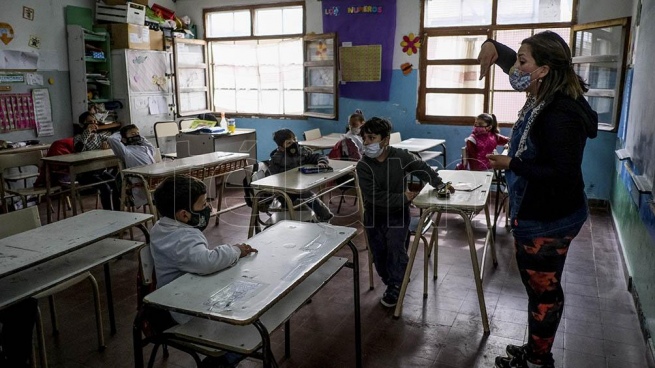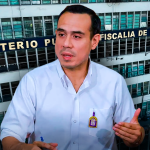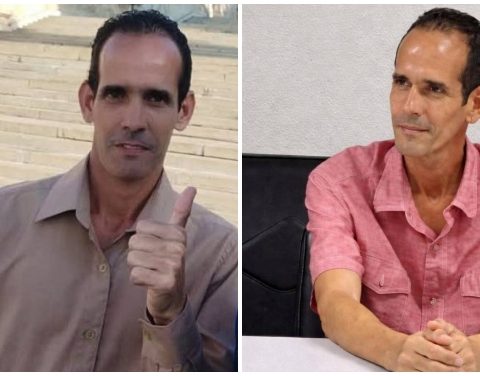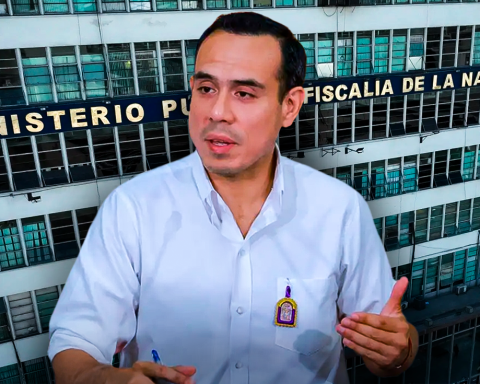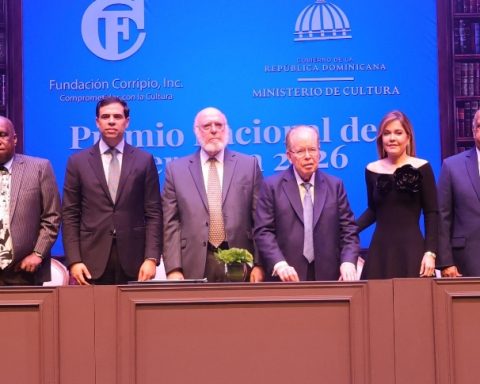Health ministers from all over the country reinforced the need to continue using the chinstrap indoors and keep environments ventilated, while also agreeing to suspend the mandatory compliance with the two-meter distance.
The Federal Health Council (Cofesa) informed after their meeting that both the committee of experts that advises the Ministry of Health of the Nation, as well as the Health Education working group, in which the Pan American Health Organization, the Argentine Society of Pediatrics and UNICEF participate, “have It is recommended to continue with the mandatory use of the chinstrap, including in school settings, given the time of year and the possible concomitant circulation of different respiratory viruses.
Cofesa’s recommendation became known after the districts of Mendoza, Land of Fire and Buenos aires citydecide the optional nature of the chinstrap starting next Monday.
In this context, the Minister of Education, Jaime Perczyk, reported through the social network Twitter that “from now on, each educational jurisdiction will be able to make the decision to use the chinstrap or not, in line with what their health ministries decide.”
Perczyk made this publication during a visit to the province of Tierra del Fuego, about which he tweeted that “together with Governor @gustavomelella, Deputy Governor @monica_urquiza, Minister of Education @analiacubino and Minister of Health, Judith Di Giglio, we agreed that as of Monday the use of the chinstrap in the educational system of Tierra del Fuego will be optional.
Meanwhile, the Minister of Health, Carla Vizzotti, warned that specialized childhood agencies “are emphatic in supporting the use of the chinstrap” in schools due to the circulation of the coronavirus and other respiratory viruses.
Cofesa agreed to “reinforce the opportunity to co-administer” influenza and anticovid vaccine
The Federal Health Council (Cofesa), which brings together all the ministers of the country’s area, agreed this Friday “to reinforce the opportunity for the co-administration of the flu and Covid-19 vaccines”facing the start of the flu vaccination that will begin on March 25, reported the Ministry of Health.
In addition, he established “strengthen communication and dissemination on the importance of applying the booster dose prior to a possible increase in the number of cases and the arrival of the cold months.”
The health portfolio highlighted that in the last week the early circulation of the Influenza virus was detected, which generated “a high number of cases” together with a “plateau of the downward trend in covid cases due to the omicron variant in the last week. ” after eight consecutive weeks of relegation.
He explained that there is currently “a population with high immunity against Covid (natural and by vaccines)but susceptible to other respiratory viruses that two years ago did not circulate or had low circulation, mainly in children, who are one of the main transmitters of respiratory viruses”.
In relation to Covid-19, Cofesa highlighted that there is “global uncertainty” about the behavior of the SARS-CoV-2 virus in the coming monthsespecially during the southern hemisphere winter (new variants, new spikes, co-circulation with other viruses)”.
Despite the fact that coverage levels of 90% were achieved in the first dose and 80% of complete schemes in the total population, and more than 15,000,000 booster doses have already been applied, “since the end of last January there has been a progressive decrease in the number of doses applied per week and mainly in the application of the booster dose”.
It was also agreed to move to “weekly reports” in relation to the dissemination of data on the covid-19 pandemic in Argentina and “advance a transition strategy for the comprehensive approach to respiratory viruses”
This is in relation to “diagnostic policies, isolation, indicators, epidemiological surveillance, among others, of federal implementation” which will have a tentative date of May 2022.
Cofesa also established the “flexibility of entry requirements for travelers, carriers and crew members, safe corridors and neighborhood border transits.”
“Yesterday we had a meeting to review recommendations for schools with the Pan American Health Organization (PAHO), the United Nations Children’s Fund (Unicef) and the Argentine Society of Pediatrics (SAP) and they were very emphatic in supporting the use of the chinstrap,” Vizzotti said this morning in statements by Radio Metro.
For his part, the Buenos Aires Minister of Health Nicolás Kreplak affirmed this morning in radio statements: “We have defined the mandatory nature of the chinstrap and good quality ventilation in the classrooms. With that plus vaccination, we are fine. We have to sustain this, We have to see how the pandemic responds to other conditions,” he said, adding: “At the moment it is mandatory (the use of a mask) to take care of boys and girls.”
Likewise, he pointed out that “these conditions will be evaluated during April to see what will be done in May” and warned that “you have to be responsible” before any modification.
This afternoon, the Buenos Aires government announced that students at all levels of schools in the City of Buenos Aires will be released from the obligation to wear the mask inside the classroom starting next Monday, from when its use will be optional.
The head of the Buenos Aires government, Horacio Rodríguez Larreta, stressed that this decision will not cover the teaching staff and assured that it seeks to “improve the socio-emotional well-being of the children by recovering the dynamics in the classrooms and the links with their teachers and their peers”
The measure replicates the decision made in the province of Mendoza, where also from next Monday the use of the mask will be optional in schools.
This afternoon, the Federal Health Council agreed that “in this transition stage, entering the winter season with the circulation of other respiratory viruses and uncertainty about the behavior of SARS-CoV-2, the need to maintain prevention measures that are cross-cutting for all respiratory viruses such as the use of chinstraps in interior spaces”.
He also spoke of “ensuring adequate ventilation of environments, frequent hand washing, avoiding going to work, educational activities or public places in the presence of symptoms and suspending the mandatory compliance with the 2-meter distance.”
